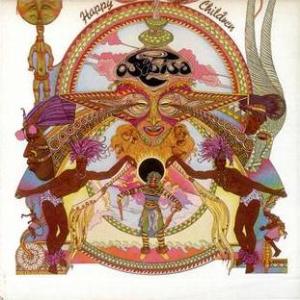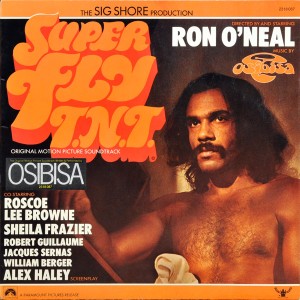posted by record facts

Happy Children is the fifth studio album by Ghanaian Afro rock band Osibisa released in 1973 by Warner Bros. Records WB 2732.
In the wake of the massive early-’70s success of Santana, a flurry of groups that combined rock with traditional percussion were signed to major labels.
Osibisa, though a completely different animal than Carlos Santana and crew, were one of these groups. On Happy Children, the band’s fourth album and one of their best, Osibisa emerge as a true world fusion group, merging a myriad of styles to an extent unmatched by almost any other unit of the period.
The band usually shies away from anything like traditional pop structures, favoring long jams played on top of a repetitive bass vamp in the tradition of live Jimi Hendrix and Miles Davis’s Bitches Brew period. Unlike these two artists, however, Osibisa usually emphasizes group dynamic shifts and Blood Sweat and Tears/Tower of Power-style written-out horn lines over individual solos.
As they were an African group recording in London, the band’s basic rhythms also differ significantly from those of its contemporaries.
They play a style of music that has its roots in authentic tribal drumming and chants. Consequently, there are similarities to New Orleans second line, Southern and West Coast/Sly Stone funk, Jamaican reggae, and Afro-cuban jazz, but in a raw, driving manner that seems to pre-date all of these styles.
At the same time, on several tunes, Osibisa brings a Duke Ellington-like harmonic sense that belies the members’ musical sophistication.
Though they don’t generally approach anything resembling a pop tune here (which might make the album a hard listen for the casual funk fan), Happy Children is a fascinating glimpse at a band successfully fusing a celebratory, pre-rock energy with ancient rhythms and modern jazz harmony.
Track listing
- Happy Children – 6:32
- We Want to Know (Mo) – 5:59
- Kotoku – 2:39
- Take Your Trouble… Go – 4:04
- Adwoa – 4:16
- Bassa-Bassa – 4:57
- Somaja – 3:35
- Fire – 5:20
Personnel
- Teddy Osei – tenor saxophone, flute, percussion, vocals
- Sol Amarfio – bongos, drums
- Mac Tontoh – trumpet, flugelhorn
- Kofi Ayivor – congas, percussion
- Jean-Karl Dikoto Mandengue – bass
- Jean-Alain Roussel – keyboards
Production
- Producer – Peter Gallen
- Engineer – Ashley Howe
- Cover illustration – Jeff Schrier
- Art direction – Ed Thrasher
- Photography – Fin Costello
Notes
Released: 1973
Recorded: September 1973 Studio Lansdowne Studios, Holland Park, London
Genre: Afrobeat
Length: 37:22
Label – Warner Bros. Records
